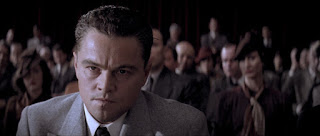Eastwood Drops Macho and Gets Sensitive: J. Edgar Is a Sympathetic Portrait of a Closeted Man
In addition to evidence that J. Edgar Hoover was gay, a cross-dresser, a conspiracy nut, and a Red-hater, in the engrossing new biopic J. Edgar, director Clint Eastwood contends that the notorious G-man and founder of the Federal Bureau of Investigations was also a major nerd. A fascinating portrait of an influential American, J. Edgar presents Hoover (Leonardo DiCaprio) as a flawed but prescient figure whose public role building the FBI into an important institution is contrasted with a private life as a closeted gay man devoted to his right-hand man Clyde Tolson (Armie Hammer), who became a devoted soulmate.
For the most part, Eastwood tends to soft pedal Hoover's most malicious and damaging acts of wire-tapping and bad behavior, glossing over the fallout of his character assassination. Eastwood and screenwriter Dustin Lance Black (Milk) prefer a more humanizing approach. J. Edgar begins with a gray-haired, dour, heavyset, and aging Hoover dictating a self-aggrandizing autobiography to a handsome underling, but flashes back frequently to a spryer man whose zeal for commie hunting was formed in the anarchist movement of the post-World War I era. Trained under fellow Red-hater Mitchell Palmer (Geoff Pierson), Hoover went on to advocate for increased power for the FBI, including the right to bear arms and for the same powers normally afforded to a police force. While the rest of the Feds mock Hoover for his obsession with fingerprinting and deride his "science lab" inquiries into crime scene analysis, Eastwood gives Hoover his history-book props.
But at other times, Hoover's crime fighting zeal spilled over into power-mad mania. He wanted to create an FBI fingerprint for every American, believed Emma Goldman and other anarchists' critiques of the government were grounds for deportation, and seemed to confuse the rumored sexual indiscretions of Martin Luther King Jr., Eleanor Roosevelt, and JFK with political radicalism. Drawing a line in the sand between proper and improper behavior, Hoover clearly saw his own homosexual yearnings as permissible but the sex lives of others as national scandals. J. Edgar touches on Hoover's often irrational tyranny, from the dismissal of agents whose looks didn't fit his image of a G-man to his loosey-goosey approach to First Amendment and due process rights.
J. Edgar is probably not the film history buffs were anticipating, especially coming from one of the butchest directors in Hollywood. Instead, it is humanizing and complex and makes Hoover's conflicted nature as a closeted gay man, more than his many FBI triumphs and mistakes, its linch pin.
For those willing to go there, J. Edgar even hints at the damage that repression can do, when the shame reputedly stoked by Hoover's mother (Judi Dench) flowers into fanaticism. In so many of his previous roles, DiCaprio practically levitates with the golden promise of youth. But in this film, he is as earthbound as a lead balloon, weighed down by not just the sobriety of his job, but the baggage of smothering mothering and repressed homosexuality. Looking portly and tortured by his feelings of self-doubt and a need for approval, DiCaprio delivers a magnificent performance.
Eastwood is having a very Brokeback moment here, offering a sensitive portrait of the brutality of remaining closeted and the inability for two otherwise straight-laced men to express affection. At key moments, the film gives insight into the carefully circumscribed life of gay men in another era. Hoover's refusal to dance with a woman at a fancy nightclub is a clear sign to the women at the table that Hoover is gay, and in one fascinating scene where Hoover "interviews" Clyde Tolson for a job, Tolson's gestures of straightening a mussed curtain and offering Hoover a handkerchief to wipe his sweaty brow become a kind of unspoken show of interest and caring that cements their lifelong relationship.
Eastwood could have chosen many directions for his film about the infamous commie-hunter, but the fact that he wanted to offer a compassionate and generous portrait of the internal conflicts of a closeted gay man makes for a far more interesting and unexpected film. Eastwood has crafted a sensitive and endearing portrait of a troubled man who wants to do good, but often does the worst.—Felicia Feaster




Comments